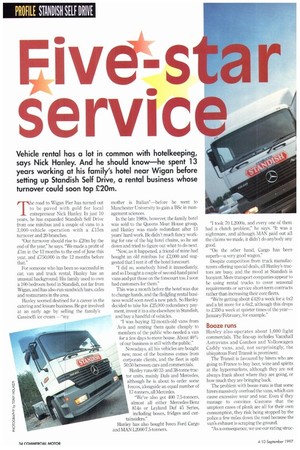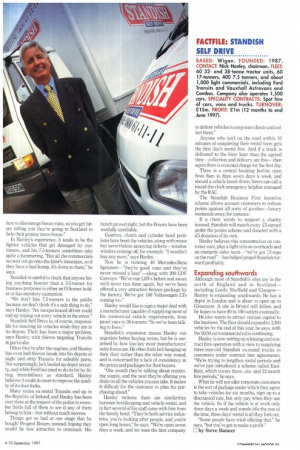PROFILE SPNDISH SELF ENE
Page 36

Page 37

If you've noticed an error in this article please click here to report it so we can fix it.
Vehicle rental has a lot in common with hotelkeeping, says Nick Hanley. And he should know—he spent 13 years working at his family's hotel near Wigan before setting up Standish Self Drive, a rental business whose turnover could soon top E20m.
The road to Wigan Pier has turned out to be paved with gold for local entrepreneur Nick Hanley. In just 10 years, he has expanded Standish Self Drive from one minibus and a couple of vans to a 3,000-vehicle operation with a £15m turnover and 20 branches.
"Our turnover should rise to £20m by the end of the year," he says. We made a profit of £1m in the 12 months to the end of June this year, and £750,000 in the 12 months before that."
For someone who has been so successful in car, van and truck rental, Hanley has an unusual background. His family used to own a 100-bedroom hotel in Standish, not far from Wigan, and has also run sandwich bars, cafes and restaurants in the area.
Hanley seemed destined for a career in the catering and leisure business. He got involved at an early age by selling the family's Cassinelli ice cream —"my mother is Italian"—before he went to Manchester University to gain a BSc in management sciences.
In the late 1980s. however, the family hotel was sold to the Queens Moat House group, and Hanley was made redundant after 13 years' hard work. He didn't much fancy working for one of the big hotel chains, so he sat down and tried to figure out what to do next.
"Now, as it happened, a friend of mine had bought an old minibus for £2,000 and suggested that I rent it off the hotel forecourt.
"I did so, somebody hired it immediately, and so I bought a couple of second-hand panel vans and put those on the forecourt too. I soon had customers for them."
This was a month before the hotel was due to change hands, and the fledgling rental business would soon need a new pitch. So Hanley decided to take his 125,000 redundancy payment, invest it in a site elsewhere in Standish, and buy a handful of vehicles.
"I was buying 12-month-old vans from Avis and renting them quite cheaply to members of the public who needed a van for a few days to move house. About 40% of our business is still with the public." Nowadays, all his vehicles are bought new, most of the business comes from corporate clients, and the fleet is split 50-.50 between cars and commercials. Hanley runs 6032and 38-tonne tractor units, mainly Dafs and Mercedes, although he is about to order some Ivecos, alongside an equal number of 17-tonners, all Mercedes.
"We've also got 400 7.5-tonners, almost all either Mercedes-Benz 814s or Leyland Daf 45 Series, including boxes, fridges and cur tainsiders."
Hanley has also bought Iveco Ford Cargo and MAN L2000 7.5-tonners. "I took 70 L2000s, and every one of them had a clutch problem," he says. "It was a nightmare, and although MAN paid out all the claims we made, it didn't do anybody any good.
"On the other hand, Cargo has been superb—a very good wagon."
Despite competition from truck manufacturers offering special deals, all Hanley's tractors are busy, and the mood at Standish is buoyant. More transport companies appear to be using rental trucks to cover seasonal requirements or service short-term contracts rather than increasing their core fleets.
"We're getting about £420 a week for a 4x2 and a bit more for a 6x2, although this drops to £350 a week at quieter times of the yearJanuary/February, for example."
Booze runs
Hanley also operates about 1,000 light commercials. The line-up includes Vauxhall Astravans and Combos and Volkswagen Caddy vans, and, not surprisingly, the ubiquitous Ford Transit is prominent.
The Transit is favoured by hirers who are going to France to buy beer, wine and spirits at the hypermarkets, although they are not always frank about where they are going, or how much they are bringing back.
The problem with booze runs is that some hirers massively overload the vans, which can cause excessive wear and tear. Even if they manage to convince Customs that the umpteen cases of plonk are all for their own consumption, they risk being stopped by the police a few miles down the road because the van's exhaust is scraping the ground.
"As a consequence, we use our rating struc ture to discourage booze runs, so you get hirers telling you they're going to Scotland to help their granny move house."
In Hanley's experience, it tends to be the lighter vehicles that get damaged by customers, and his 7.5-tonners sometimes take quite a hammering. "But all the commercials we rent out go onto the hirer's insurance, so if they have a bad bump, it's down to them," he says.
Standish is careful to check that anyone hiring anything heavier than a 3.5-tonner for business purposes is either an 0-licence holder or has statutory exemption.
"We don't hire 7.5-tormers to the public because we don't think it's a safe thing to do," says Hanley. An inexperienced driver could end up wiping out every vehicle in the street" Standish Self Drive is, of course, responsible for insuring its vehicles while they are in its depots. Theft has been a major problem, says Hanley, with thieves targeting Transits in particular.
Often they're after the engines, and Hanley has even had thieves break into his depots at night and strip Transits for saleable parts. Not surprisingly, he's beefed up depot security, and while Ford has tried to do its bit by fitting immobilisers as standard, Hanley believes it could do more to improve the quality of its door locks.
Many stolen ex-rental Transits end up in the Republic of Ireland, and Hanley has been over there at the request of the police to examine fields full of them to see if any of them belong to him—but without much success.
Things got so bad at one stage that he bought Peugeot Boxers instead, hoping they would be less attractive to criminals. His hunch proved right, but the Boxers have been woefully unreliable.
Gearbox, clutch and cylinder head problems have beset the vehicles, along with minor but nevertheless annoying defects—window winders coming off, for example. "1 wouldn't buy any more," says Hanley.
Now he is running 40 Mercedes-Benz Sprinters—"they're good vans and they've never missed a beat" —along with 200 LDV Convoys. "We've run LDVs before and swore we'd never run them again, but we've been offered a very attractive finance package by the factory. We've got 100 Volkswagen LTs coming too."
Hanley would like to sign a major deal with a manufacturer capable of supplying most of his commercial vehicle requirements, from panel vans to 38-tonners: "So we've been talking to Iveco."
Standish's expansion means Hanley can negotiate better buying terms, but he is surprised by how low-key most manufacturers' sales forces are. He often finds he's banging on their door rather than the other way round, and is concerned by a lack of consistency in the prices and packages for fleet buyers.
"One month they're talking about restricting supply, and the next they're offering you deals on all the vehicles you can take. It makes it difficult for the customer to plan his purchasing ahead."
Hanley reckons there are similarities between hotelkeeping and vehicle rental, and in fact several of his staff came with him from the family hotel. "They're both service industries, you're looking after people, and you're open long hours," he says. "We're open seven days a week, and we were the first company to deliver vehicles to corporate clients and collect them."
Anyone who isn't on the road within 10 minutes of completing their rental form gets the first day's rental free. And if a truck is delivered to the hirer later than the agreed time—collection and delivery are free—then again there is no rental charge for the first day.
There is a central booking hotline open from Sam to 8pm seven days a week, and should a vehicle break down, hirers can call a round-the-clock emergency helpline managed by the RAC.
The Standish Business First incentive scheme allows account customers to redeem points against all sorts of goodies—luxury weekends away, for instance.
If a client wants to support a charity instead, Standish will match every £5 earned under the points scheme and donated with a £5 donation of its own.
Hanley believes this concentration on customer care, plus a tight rein on overheads and an energetic sales team—"we've got 13 reps on the road" has helped propel Standish forward profitably.
Expanding southwards
Although most of Standish's sites are in the north of England and in Scotland— including Leeds, Sheffield and Glasgow— Hanley is expanding southwards. He has a depot in London and is about to open up in Gloucester. A site in Bristol will follow, and he hopes to have 80 to 100 outlets eventually.
He also wants to attract venture capital to the business. The fleet should expand to 3,300 vehicles by the end of this year, he says, with the 50:50 car/commercial ratio continuing.
Hanley is now setting up a leasing and contract hire operation with a view to supplying three-year-old Standish ex-rental trucks to customers under contract hire agreements. "We're trying to lengthen rental periods and we've just introduced a scheme called EasiRent, which covers three-, sixand 12-month hire periods," he says.
What he will not offer corporate customers is the sort of package under which they agree to take vehicles for six months, sign up to a discounted rate, but only pay when they use the vehicle. So if the vehicle is at work only three days a week and stands idle the rest of the time, three days' rental is all they fork out.
"Some people have tried offering that," he says, "but you've got to make a profit."
0 by Steve Banner FACTFILE: STANDISH SELF DRIVE BASED: Wigan. FOUNDED: 1987, CONTACT. Nick Hanley, chairman. FLEET: 60 32and 38-tonne tractor units, 60 17-tonners, 400 7.5 tanners, and about 1,000 light commercials, including Ford Transits and Vauxhall Astravans and Combos. Company also operates 1,500 cars. SPECIALITY CONTRACTS: Spot hire of cars, vans and trucks. TURNOVER: £15m. PROFIT: Elm (12 months to end June 1997).








































































































